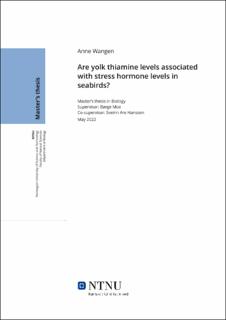| dc.contributor.advisor | Moe, Børge | |
| dc.contributor.advisor | Hanssen, Sveinn Are | |
| dc.contributor.author | Wangen, Anne | |
| dc.date.accessioned | 2022-07-05T17:22:36Z | |
| dc.date.available | 2022-07-05T17:22:36Z | |
| dc.date.issued | 2022 | |
| dc.identifier | no.ntnu:inspera:104135638:23518387 | |
| dc.identifier.uri | https://hdl.handle.net/11250/3002932 | |
| dc.description.abstract | Flere norske sjøfuglbestander minsker. Årsaken til populasjonsnedgangen kan være sammensatt, og ulike forklarende faktorer som klimaendringer, redusert mattilgang, forurensning, fremmede arter og sykdom har blitt foreslått. Dette er stress-induserende faktorer som til slutt kan føre til redusert reproduksjon og overlevelse. De siste årene har det vært økt oppmerksomhet på sykdom som en mulig forklarende årsak, og da spesielt sykdom og symptomer assosiert med tiaminmangel. Tiamin er et essensielt næringsstoff for sjøfugl som de må få gjennom dietten. For lave nivåer med tiamin kan blant annet føre til nevrologiske lidelser og nedsatt immunforsvar. Tiaminmangel har blitt foreslått som en medvirkende årsak til reproduksjonsvikt og populasjonsnedganger i Østersjøen og i Nord-Atlanteren. Hypotesen er at tiaminmangelen i sjøfugl skyldes mangel av dette spesifikke vitaminet i det marine næringsnettet. I dette studiet undersøkte vi en alternativ hypotese, at dårlig mattilgang forårsaker generelt lave nivåer av tiamin, andre vitaminer og næringsstoffer. Kortikosteron er fuglenes stresshormon, kjent for å være følsomt for fugler sin ernæringsstatus. Under antagelsen at kortikosteron reflekterer ernæringsstatus og mattilgang, ble det testet om kortikosteron-nivåer og tiamin-nivåer korrelerer. Eggeplomme ble samlet inn fra tre ærfugl- og en krykkje-populasjon. Det ble ikke funnet noen signifikant korrelasjon mellom kortikosteron- og tiamin-nivå. Kortikosteron- og tiamin-nivåene i ærfugl-populasjonene var forskjellige fra hverandre. Dette studiet så på korrelasjon og kan derfor ikke si noe om kausale forhold, men resultatet indikerer likevel at tiamin nivåer er uavhengige av kortikosteron nivåer. Disse funnene støtter hypotesen om at tiaminmangel i sjøfugl kommer av et underskudd på dette vitaminet i det marine næringsnettet fremfor dårlig mattilgang generelt. | |
| dc.description.abstract | Several Norwegian seabird populations are declining. The reason may be complex, and proposed explanatory factors include climate change, reduced food availability, pollution, alien species, and diseases. These factors are stress-inducing and may ultimately lead to reduced reproductive investment and survival. In recent years there has been an increased focus on diseases as a possible cause, especially diseases and symptoms associated with thiamine deficiency. Thiamine is an essential nutrient for seabirds that needs to be acquired through their diet. Low levels of thiamine could lead to e.g. neurological disorders and immunosuppression. Thiamine deficiency has been suggested as a contributing factor for reproductive failure and population decline in seabirds breeding in the Baltic Sea and the North-Atlantic Ocean. The hypothesis being that thiamine deficiency in seabirds is caused by episodes of deficiency of this specific vitamin in the marine food web. In this study we examined an alternative hypothesis that poor food availability could cause generally low levels of thiamine as well as other vitamins and nutrients. Corticosterone is the avian stress hormone, known to be sensitive to body condition and nutritional status. Under the assumption that corticosterone levels reflect nutritional status and food supply, it was tested if corticosterone and thiamine levels correlated. Egg yolk was collected from three common eider populations and one black-legged kittiwake population. No significant correlation between corticosterone and thiamine levels was found. Thiamine and corticosterone levels differed among the common eider populations. This study was correlational and cannot reveal any causal relationships, but the results indicate that thiamine levels are independent of corticosterone levels. The results therefore support the hypothesis that thiamine deficiency in seabirds comes from a specific deficiency of thiamine in the marine food web rather than poor food availability. | |
| dc.language | eng | |
| dc.publisher | NTNU | |
| dc.title | Are yolk thiamine levels associated with stress hormone levels in seabirds? | |
| dc.type | Master thesis | |
